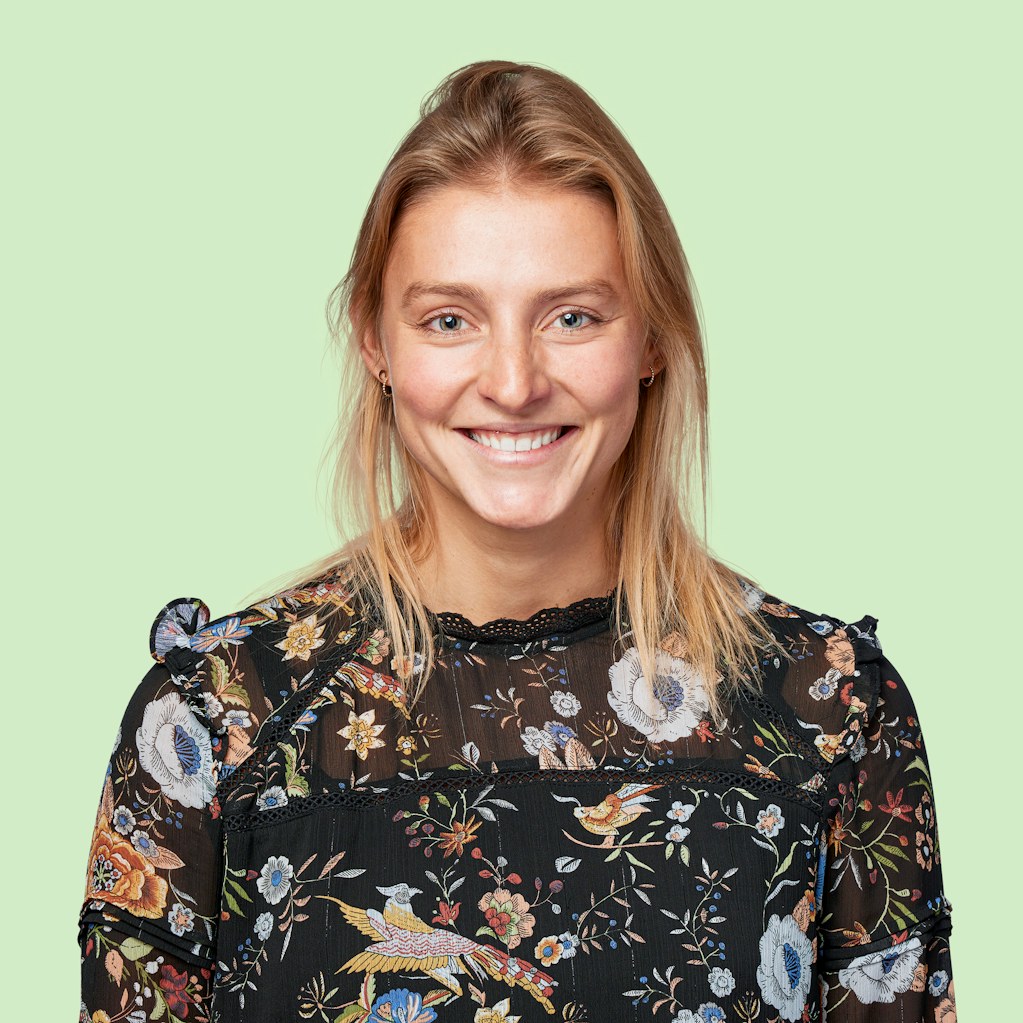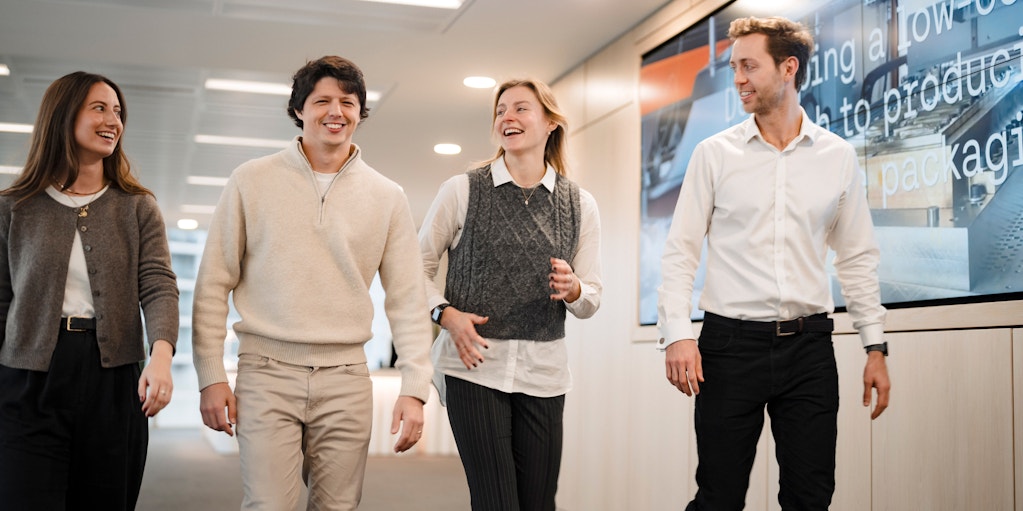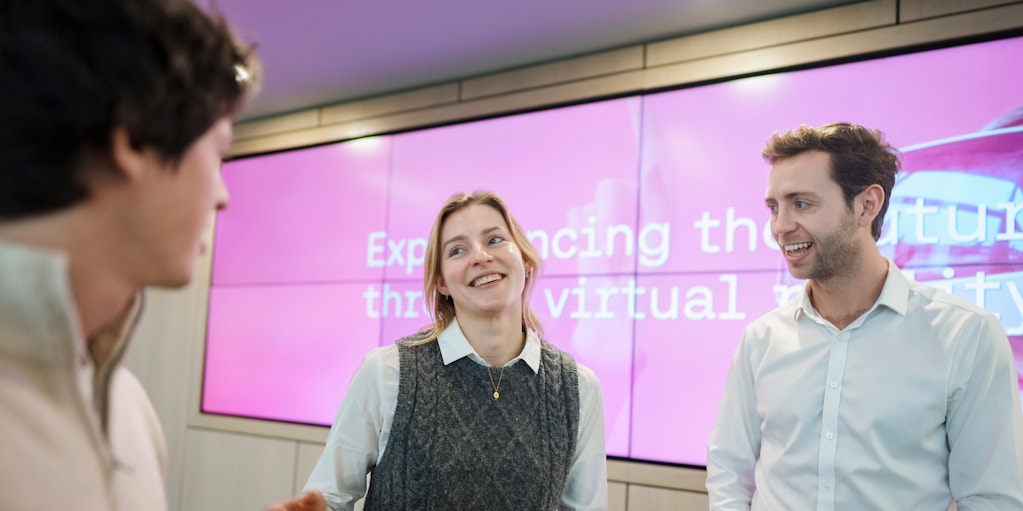
15 minutes with: Iris Alting
Tags
Our experts are on the frontlines of bringing ingenuity to life for our clients. They accelerate new growth ideas from concept, through design and development to commercial success. And they revitalise organisations with the leadership, culture, systems and processes to make innovation a reality.
In this series, you’ll meet some of the brilliant minds creating change every day.

A keen advocate for environmental sustainability in all its forms, Iris Alting joined PA following an internship programme. After moving from the Netherlands to London, Iris collaborates with partner organisations and clients across sectors to help them tackle some of the most urgent challenges resulting from climate change.
What is your background and how did you come to PA?
From a young age, I’ve been interested in nature and animals. I always wanted to become a vet, but realised that would mean I could only help animals that were already injured, instead of preventing this. When I started surfing and noticed plastic floating around me in the ocean, it suddenly all made sense. I wanted to protect the environment and animals from negative human impact on our planet, both from a product innovation and climate change point of view. With that in mind, I studied Product and Packaging Innovation in the Netherlands and completed a PA internship where I researched sustainable packaging. I then explored the world and met many fantastic, inspiring people, and worked across different markets. In 2020, I moved to London to join PA as a consultant.
PA is unique to the degree that we have strong technology and innovation capabilities, with a dedicated Global Innovation and Technology Centre (GITC). Having worked from both our GITC as well as our London offices for over three years, I’ve experienced the link between technology and strategy first-hand and find the expertise from both sides very useful in project teams.

What’s different about working with PA?
I always describe PA to friends as a unique way of consulting. It’s not just about management consulting and coming up with great ideas and strategies – PA also has in-house expertise from designers, engineers, and scientists to build real-life samples, products, and technology. PA sits at the nexus of strategy and technology. On top of this, PA is highly supportive of learning and taking career breaks to grow and develop. For example, I’ve started a Masters degree in Business Transformation and Sustainability alongside my role, and was part of the UN Global Compact Young Sustainable Development Goals Innovator Programme (YSIP) to come up with a sustainable innovation that supports PA through the UN Sustainable Development Goals framework. I also had the opportunity to travel to Australia in 2023, to explore my interest in Ocean Conservation, as part of a sabbatical.
It might sound cliché, but what really makes PA different is the people. I’m surrounded by amazing, insightful colleagues and am always surprised by the wide range of expertise PA has. An example of this in practice was our work in partnership with a client to reduce e-waste through circular design – our collaborative approach and understanding helped to find a solution that changed how products were designed at the start, merging the knowledge of our strategy and technology experts, particularly understanding what would happen with the product once it reaches end-of-life. In our case, this meant start of life, as these ‘waste’ materials are of high value.
There’s also a strong sense of community at PA. At the start of 2023, a group of us visited The Wave an artificial wave-pool in Bristol in the UK, hosting people of all ages, backgrounds and abilities to enjoy surfing and experience the joy of waves and their many physical and mental health benefits. It’s 100% powered by sustainable energy, so great for fun as well as for the world! And in 2022 we went on a trip to Newquay in Cornwall, UK to go surfing. As a passionate surfer, I’ve loved sharing this aspect of my life with colleagues.
How would you describe your job to someone you’ve never met?
Companies that successfully integrate sustainability into their business strategies achieve a higher return on investment than companies that don’t. As a Business Transformation and Sustainability Consultant, I support organisations to take pragmatic and tangible steps to future-proof practices and improve their sustainability from an environmental, social, and economic standpoint. I also help them to become more resilient to the effects of climate change. This might involve building strategies to reduce microplastics, waste, carbon emissions, and water usage, as well as optimising supply chains and building roadmaps to integrate renewable energy solutions. Included in this are key practices like stakeholder engagement, policy and regulatory compliance, and environmental, social, and governance (ESG) reporting.
The scope of work I do is very broad, and I have the opportunity to inspire people, educate them, and recommend the most sustainable solution.
I help organisations with some of their biggest challenges from a sustainability and climate change point of view. Often, this includes guiding a mindset shift, and helping clients to think in a more circular way.”
It’s about advising and creating awareness, which depends on the client and where they are in their journey.
Another important point is that sustainability doesn’t need to be more expensive or take years to integrate. If you consider the end-to-end supply chain, there are so many technologies out there on the market already. Sustainable supply chains and operations are a long-term investment, but again, it takes a mindset change. Do chocolate bars really need a two-year shelf-life, for example? To answer these questions, you start looking at the entire supply chain (from producer to user), as well as social and governance aspects.
How has your work changed in recent years?
Changing regulation is pushing companies to take significant steps to reduce their impact on the environment, whether it’s achieving net zero carbon emissions, using more sustainable materials, or reporting according to the latest standards. And, on top of this, people match with their sustainable beliefs. It’s been a difficult year, especially with market inflation and geographical conflicts, but I’m optimistic for 2024 and hope we can always see sustainable business development as important and urgent. It does depend on the industry the client is operating in, but industries are highly influential – if one company makes a rapid move to, for example, reduce plastics in their portfolio, others follow. It’s then on us as consultants to help our clients make these step changes – and not to be afraid to have a strong opinion on this.
Once the ball starts rolling, it’s only a matter of time before changes become the norm. I’m hopeful that there will be more climate urgency, and would like to see more consistent regulation. It would be fantastic to see companies act because it’s what they want and need to do to protect the future of the planet and their organisation, not just to avoid fines.

What’s the role of ingenuity in the work that you do?
Even though a warmer climate can seem appealing to some, an increase in global temperatures of 1.5 degrees Celsius or above – as stated in the Paris Agreement – will have detrimental effects on our planet and its ecosystems. By collaborating with some of the world’s biggest organisations, I can advise, inspire, and push for low carbon-emission solutions that limit increasing temperatures.
By identifying, designing, and implementing innovative solutions and technologies, I use creativity and ingenuity to advise on strategies that not only meet sustainability goals, but also align with clients’ objectives, without compromising efficiency and profitability.”
In general, it’s not just about engaging senior people in the company. The power really lies in engaging with internal and external stakeholders to understand impact further down the supply chain. For example, if you change a product’s material, how will it impact the production line, transport, and material recovery facilities? Then there’s the user mindset – will they still use the product when it’s made of different materials, and will they understand how to dispose of the product in a responsible way? Is the product reusable and/or recyclable? This is where PA’s strength really lies, considering all these different stages and impacts, because we have a broad range of expertise and a collaborative view.

What are you most excited about and inspired by in the sustainability space?
Even though the journey to achieving net zero is a long one, it’s hopeful to see that there are finally global commitments made on reducing carbon emissions, such as those at the most recent Conference of the Parties on climate change (COP28). Over 80,000 people attended COP28, showing it’s not just global leaders talking about sustainability. Whether you’re a student, an entrepreneur, or a renewable energy company, everyone is considering the impact of carbon emissions. The coming years will show if countries and global leaders keep the promises they have made.
It’s also fascinating to see rapid technology innovation and the speed of scaling up of successful technologies. I’m excited to work on some of these transitions, particularly around renewable energy such as offshore wind.”
There is now tangible awareness, driven by science, of the climate crisis and its impact, not just by those that work in sustainability but particularly across the wider public.
Which of your projects are you most proud of?
I’ve worked on many projects at PA and it’s very difficult to pick just a few – but what I find particularly exciting is when you see a product that you have helped to sustainably redesign on the supermarket shelves. To name one example, I’ve been fortunate to join the PA team working with Mondelēz to understand how to decarbonise Oreo and Belvita biscuits, by looking at high-impact stages in the supply chain – particularly around agriculture, including ingredients like chocolate and wheat.
What are your future goals, professionally and personally?
Professionally, I want to learn as much as I can, and eventually specialise in a certain sustainability area to become a leader in that specific niche. By having experience across different sectors, I’m able to review climate challenges from different angles and understand wider impact across different stakeholders. I’d love to attend more sustainability-focused conferences, meet more like-minded people, and publish more articles to create more awareness.
As a passionate surfer, I’m always interested in the link between the work I do and how this impacts oceans and nature. I’d love to explore more of the underwater world to learn how we can protect some of the most vulnerable ecosystems, and learn from indigenous and local people in how they take care of their environments.
We call our planet ‘Earth’, but our planet only consists of 30 percent land versus 70 percent ocean. Considering that we know more about space than our ocean, there is so much to learn. Getting more involved in initiatives like coral planting, diving to explore the unknown, and creating ocean-awareness is a short-term goal.
Sustainability can sometimes be challenging as we can’t always directly see the impact of climate change on our environment, but recent years have shown further increase in temperatures and more extreme weather events that have impacted land and ocean ecosystems, like reef and coral. We’re simply in an era where we can’t ignore the reality anymore.

What advice would you give to someone who’d like to follow a similar career path to you?
Sustainability encapsulates a broad range of efforts aiming for a more sustainable and equitable future. I would recommend having a curious mindset, and not being afraid to ask questions. For example, the question of ‘what does sustainability mean?’ might sound silly, but to capture the true meaning in just a few words is highly challenging. Attending events is another useful way to meet people beyond your industry, to get a broader view and make long-lasting connections. Self-education is important too, and getting involved in programmes where you can learn and develop, particularly those that you find interesting to keep motivated.
Finally, what are you looking forward to right now?
I’m looking forward to some exciting opportunities in the pipeline. I’ve started my Masters degree at University College London, where I’m hoping to learn more skills to support businesses in making – or continuing – the transition to sustainability. Lastly… I cannot wait to go surfing again and further explore the world underwater!
Explore more







